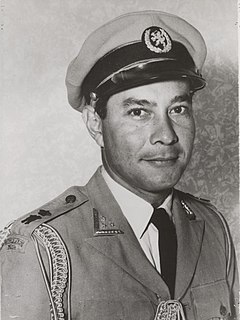The Ministry of Education and Religious Affairs was a government ministry of the State of Pasundan. The ministry was responsible for the schools, university, and religious matters in the State of Pasundan.
The Ministry of Education and Religious Affairs was a government ministry of the State of Pasundan. The ministry was responsible for the schools, university, and religious matters in the State of Pasundan.
After the establishment of the Adil Cabinet on 8 May 1948, prime minister Adil Puradiredja appointed Otto Judakusumah as the Minister of Education and Religious Affairs. [1] The formation of the ministry was done a month later, on 11 June 1948, after the handover of the authority from the Recomba (government commissioner for administrative affairs) to the Minister of Justice. The instrument of transfer for this purpose was the Staatsblaad (State Gazette) 1948 No. 116. [2]
Even though most of the authorities regarding to education and religion was given to the ministry, the federal government still managed matters relating to secondary educations, higher educations (university) and the supply of textbooks and other educational equipment. Nevertheless, the limitations in the ministry was less than the limitations in other ministries. [3]
According to the ministry, the goals for the education in the State of Pasundan are as the following: [4]
After the formation of the Anwar Cabinet on 11 January 1950, the Ministry of Education and Religious Affairs was divided into two different ministries: the Ministry of Education, headed by Minister Otto Judakusumah, and the Ministry of Religious Affairs, headed by Minister Ahmad Hassan. [5]
| No | Portrait | Name | Took office | Left office | Cabinet | R |
|---|---|---|---|---|---|---|
| 1 |  | Otto Judakusumah | 8 May 1948 | 14 October 1948 | Adil | [6] |
| 2 | Prawiradinata | 10 January 1949 | 31 January 1949 | Djumhana I | [7] | |
| 3 | Judawinata | 31 January 1949 | 18 July 1949 | Djumhana II | [7] | |
| 4 |  | Otto Judakusumah | 18 July 1949 | 11 January 1950 | Djumhana III | [8] |
| 5 | Otto Judakusumah (Minister of Education) | 11 January 1950 | 23 January 1950 | Anwar | [5] | |
| Ahmad Hassan (Minister of Religious Affairs) |

The first Sjahrir Cabinet was the second Indonesian cabinet, named after the Prime Minister. It served from November 1945 to February 1946.

The second Amir Sjarifuddin Cabinet was Indonesia's sixth cabinet and was the result of a reshuffle to allow for the entry of the Masyumi Party, which gained five posts. The cabinet lasted only two months and eleven days, from 12 November 1947 to 23 January 1948, after Masyumi withdrew its ministers in protest at the Renville Agreement the government signed with the Dutch.

Sultan Hamid II was the eighth Sultan of Pontianak and the only President of the State of West Kalimantan from 1946 to its disestablishment in 1950. He was the eldest son of Sultan Syarif Muhammad Alkadrie. He was of mixed Malay-Arab ancestry and was raised by two British nationals— Salome Catherine Fox and Edith Maud Curteis.

The Federal Consultative Assembly, (BFO) was a committee established on 8 July 1948 to discuss the form of the planned federal United States of Indonesia. Its membership comprised the leaders of the various federal states established by the Dutch in the areas they occupied following their attack on the areas of Indonesia controlled by republican forces during the Indonesian National Revolution (1945–1949). It took part in negotiations with the Dutch in August and September 1948, and participated in the Dutch–Indonesian Round Table Conference at which the Dutch agreed to hand over sovereignty to the United States of Indonesia.

The APRA coup d'état was a coup d'état by Raymond Westerling's Legion of Ratu Adil (APRA) to capture Bandung and Jakarta, and to overthrow Sukarno’s unitary Republic of Indonesia. Westerling was a demobilised Dutch Captain of the KNIL, who sought to preserve the federal Republic of the United States of Indonesia, which retained the support of the Netherlands and various minority elements. Westerling's forces succeeded in capturing Bandung in the early hours of 23 January 1950.

The State of Pasundan was a federal state (negara bagian) formed in the western part of the Indonesian island of Java by the Netherlands in 1948 following the Linggadjati Agreement. It was similar to the geographical area now encompassed by the current provinces of West Java, Banten and Jakarta.

The United States of Indonesia, was a short-lived federal state to which the Netherlands formally transferred sovereignty of the Dutch East Indies on 27 December 1949 following the Dutch–Indonesian Round Table Conference. This transfer ended the four-year conflict between Indonesian nationalists and the Netherlands for control of Indonesia. It lasted less than a year, before being replaced by the unitary Republic of Indonesia.

Raden Aria Adipati Wiranatakusumah V, commonly shortened to R. A. A. Wiranatakusumah V or just as Wiranatakusumah V, was an Indonesian politician who served as the first and only Wali Negara of Pasundan, during the Indonesian National Revolution. He was also the first Minister of Home Affairs of Indonesia and the second Chairman of the Supreme Advisory Council.

The Adil Cabinet was the first cabinet established by the State of Pasundan following the formation of the state on 28 April 1948. It was composed of eight ministers and one official. Its term of office ran from 8 May 1948 to 10 January 1949.

The Third Djumhana Cabinet was the fourth cabinet established by the State of Pasundan. It was composed of nine ministers and one official. Its term of office ran from 18 July 1949 to 11 January 1950.

The Anwar Cabinet was the fifth cabinet established by the State of Pasundan. It was composed of 11 ministers. Its term of office ran from 11 to 23 January 1950.

The First Djumhana Cabinet was the second cabinet established by the State of Pasundan. It was composed of nine ministers and one official. Its term of office ran from 10 to 31 January 1949.

The Second Djumhana Cabinet was the third cabinet established by the State of Pasundan. It was composed of eight ministers. Its term of office ran from 31 January to 18 July 1949.

The Prime Minister of Pasundan was the head of government and the highest political office in the short-lived State of Pasundan (1948-1950). Appointed by the Wali Negara of Pasundan from among influential Members of Parliament, the Prime Minister was responsible to the Parliament, and his cabinet could be dismissed by a vote of no confidence.

Djumhana Wiriaatmadja was a Sundanese aristocrat, regent, politician, and diplomat.

The Wali Negara of Pasundan was the head of state and highest political office in the short-lived State of Pasundan, which existed as a Dutch-backed federal parliamentary republic from 1948 until the state's dissolution in 1950. According to the Regulations of the Constitutional Organization of Pasundan, the Wali Negara had the authority to dissolve the Parliament, appoint and discharge the Prime Minister, enact decrees, and submit law drafts and the state budget to the Parliament. If the Wali Negara died or resigned prior to the end of the term, the Speaker of the Parliament, who also acted as the Deputy Wali Negara, would have replaced him/her.

The Ministry of Home Affairs was a government ministry of the State of Pasundan. The ministry was responsible for the control of the state apparatus, civil service, and the Pasundan Police Department.

The Ministry of Justice was a government ministry of the State of Pasundan. The ministry was responsible for the justice system, penitentiary system, publishing of government gazette, dactyloscopy, and beachcombing in the State of Pasundan.

The Ministry of Health was a government ministry of the State of Pasundan. The ministry was responsible for the health system, vaccination programs, hospitals, and clinics in the State of Pasundan.

Djerman Prawirawinata was a Sundanese politician who served as the last Minister of State of Pasundan and a member of the People's Representative Council.